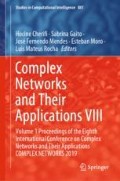Abstract
The paper analyzes how two opinions/products/innovations diffuse in a network according to non-progressive dynamics. We show that the final configuration of the network strongly depends on their relative speed of diffusion. In particular, we characterize how the number of agents that will eventually adopt an opinion (at the end of the diffusion process) is related with the speed of propagation of that opinion. Moreover, we study how the minimum speed of propagation required to converge to consensus on a given opinion is related with the percentage of agents that initially act as seeds for that opinion. Our results comple ment earlier works in the literature on competitive opinion diffusion, by depicting a clear picture on the relationships between coverage and speed of diffusion.
Access this chapter
Tax calculation will be finalised at checkout
Purchases are for personal use only
References
Auletta, V., Caragiannis, I., Ferraioli, D., Galdi, C., Persiano, G.: Minority becomes majority in social networks. In: Proceedings of WINE 2015, pp. 74–88 (2015)
Auletta, V., Ferraioli, D., Fionda, V., Greco, G.: Maximizing the spread of an opinion when tertium datur est. In: Proceedings of AAMAS 2019, pp. 1207–1215 (2019)
Auletta, V., Ferraioli, D., Greco, G.: Reasoning about consensus when opinions diffuse through majority dynamics. In: Proceedings of IJCAI 2018, pp. 49–55 (2018)
Bharathi, S., Kempe, D., Salek, M.: Competitive influence maximization in social networks. In: Proceedings of WINE 2007, pp. 306–311 (2007)
Bhattacharyya, A.: On a measure of divergence between two statistical populations defined by their probability distributions. Bull. Calcutta Math. Soc. 35, 99–109 (1943)
Borodin, A., Filmus, Y., Oren, J.: Threshold models for competitive influence in social networks. In: Saberi, A. (ed.) Proceedings of WINE 2010, pp. 539–550 (2010)
Bredereck, R., Elkind, E.: Manipulating opinion diffusion in social networks. In: Proceedings of IJCAI 2017, pp. 894–900 (2017)
Budak, C., Agrawal, D., El Abbadi, A.: Limiting the spread of misinformation in social networks. In: Proceedings of WWW 2011, pp. 665–674 (2011)
Chen, N.: On the approximability of influence in social networks. SIAM J. Discrete Math. 23(3), 1400–1415 (2009)
Chen, W., Collins, A., Cummings, R., Ke, T., Liu, Z., Rincon, D., Sun, X., Wei, W., Wang, Y., Yuan, Y.: Influence maximization in social networks when negative opinions may emerge and propagate. In: Proceedings of SDM 2011, pp. 379–390 (2011)
Easley, D., Kleinberg, J.: Networks, Crowds, and Markets: Reasoning About a Highly Connected World. Cambridge University Press, Cambridge (2010)
Fazli, M.A., Ghodsi, M., Habibi, J., Jalaly, P., Mirrokni, V., Sadeghian, S.: On non-progressive spread of influence through social networks. Theoret. Comput. Sci. 550, 36–50 (2014)
Frischknecht, S., Keller, B., Wattenhofer, R.: Convergence in (social) influence networks. In: Afek, Y. (ed.) Proceedings of DISC 2013, pp. 433–446 (2013)
Goles, E., Olivos, J.: Periodic behaviour of generalized threshold functions. Discrete Math. 30(2), 187–189 (1980)
Goyal, A., Bonchi, F., Lakshmanan, L.V.S.: Learning influence probabilities in social networks. In: Proceedings of WSDM 2010, pp. 241–250 (2010)
Granovetter, M.: The strength of weak ties. Am. J. Sociol. 78(6), 1360–1380 (1973)
Granovetter, M.: Threshold models of collective behavior. Am. J. Sociol. 83(6), 1420–1443 (1978)
Gursoy, F., Gunnec, D.: Influence maximization in social networks under deterministic linear threshold model. Knowl.-Based Syst. 161, 111–123 (2018)
Kempe, D., Kleinberg, J., Tardos, É.: Maximizing the spread of influence through a social network. Theory Comput. 11(4), 105–147 (2015)
Khoshkhah, K., Soltani, H., Zaker, M.: On dynamic monopolies of graphs: the average and strict majority thresholds. Discrete Optim. 9(2), 77–83 (2012)
Lerman, K., Yan, X., Wu, X.-Z.: The “majority illusion” in social networks. PLoS One 11(2), e0147617+ (2016)
Lou, V.Y., Bhagat, S., Lakshmanan, L.V.S., Vaswani, S.: Modeling non-progressive phenomena for influence propagation. In: Proceedings of COSN 2014, pp. 131–138 (2014)
Newman, M.: Assortative mixing in networks. Phys. Rev. Lett. 89(20), 208701+ (2002)
Peleg, D.: Size bounds for dynamic monopolies. Discrete Appl. Math. 86(2), 263–273 (1998)
Peleg, D.: Local majorities, coalitions and monopolies in graphs: a review. Theoret. Comput. Sci. 282(2), 231–257 (2002)
Rozemberczki, B., Davies, R., Sarkar, R., Sutton, C.:. GEMSEC: graph embedding with self clustering. CoRR (2018)
Schelling, T.C.: Micromotives and Macrobehavior. W. W. Norton & Company, New York (1978)
Tzoumas, V., Amanatidis, C., Markakis, E.: A game-theoretic analysis of a competitive diffusion process over social networks. In: Proceedings of WINE 2012, pp. 1–14 (2012)
Yang, J., Leskovec, J.: Defining and evaluating network communities based on ground-truth. In: Proceedings of ICDM-12, pp. 745–754 (2012)
Author information
Authors and Affiliations
Corresponding author
Editor information
Editors and Affiliations
Rights and permissions
Copyright information
© 2020 Springer Nature Switzerland AG
About this paper
Cite this paper
Fionda, V., Greco, G. (2020). Opinion Diffusion in Competitive Environments: Relating Coverage and Speed of Diffusion. In: Cherifi, H., Gaito, S., Mendes, J., Moro, E., Rocha, L. (eds) Complex Networks and Their Applications VIII. COMPLEX NETWORKS 2019. Studies in Computational Intelligence, vol 881. Springer, Cham. https://doi.org/10.1007/978-3-030-36687-2_35
Download citation
DOI: https://doi.org/10.1007/978-3-030-36687-2_35
Published:
Publisher Name: Springer, Cham
Print ISBN: 978-3-030-36686-5
Online ISBN: 978-3-030-36687-2
eBook Packages: Intelligent Technologies and RoboticsIntelligent Technologies and Robotics (R0)

